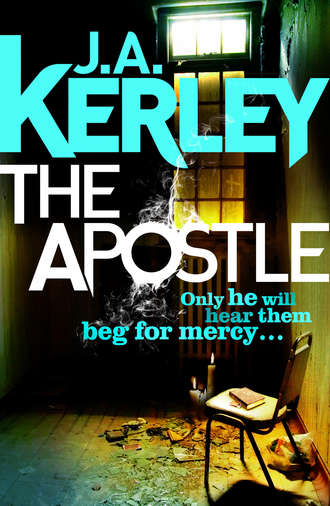
Полная версия
The Apostle
Why not park in front? Jeremy wondered. The crowds a problem? Or did they not wish to be seen?
Jeremy saw the two security types, plus another of the same rugged stature, a third who doubled as a driver, perhaps. With them were two others, one a man in a motorized wheelchair with tall tires – obviously carried in the rental van – and an auburn-haired woman, tall and slender and walking precariously between the yards, the effect of high heels sinking in to sandy ground. At one point she teetered sideways and when the red-haired bodyguard put out his hand to assist, she slapped it away.
Though Jeremy had seen the wheelchair man and auburn-tressed woman for three seconds and from two hundred feet distant, he knew their names and occupations.
He’d made money from them.
The quintet disappeared into the lush foliage at the rear of the Schrum home. Jeremy slipped his hands into his pockets and, whistling a jaunty air, strolled back to his home to ponder the meaning of the visitation.
13
Eliot Winkler’s motorized chair buzzed to the bottom of the steps to the back porch of the Schrum residence. The rear door was opened by Andy Delmont, a gospel singer and one of the Crown of Glory network’s most popular celebrities, his five albums in wide distribution. Delmont was in his early thirties, with red-blond hair, emerald-green eyes, freckle-dappled cheeks, and a bright, engaging smile that bordered on childlike. As always, Delmont looked dressed for a performance, white country-and-western-style suit with embroidered lapels and mother-of-pearl buttons, sky-blue shirt with a bolo tie, silver-tipped leather straps through a silver, cruciform fitting.
“Mr Winkler. Ms Winkler,” Delmont said, his face eager to please. “So good to see you. We didn’t have time to install a ramp, but I’m sure a couple of your men can lift you up to—”
Winkler scowled and pressed a lever on the wheelchair’s arm, the customized Viking all-terrain-wheelchair climbing the steps as the seat adjusted to keep Winkler upright. He reached the top and rolled across the threshold, Delmont having to jump back to keep his toes from being run over.
“Where is he?” Winkler demanded as he whirred past. Vanessa Winkler followed, then paused at a full-length hallway mirror to freshen her lipstick and pat her elegant coif.
“The Reverend is upstairs,” Delmont said, stepping quickly to catch up. “The doctor is with him.” Delmont nodded to a latticed metal door down a short hallway. “There’s an elevator, sir.”
Winkler rolled to the metal grate, pressing the button and rolling inside before the door was fully open. He craned his head toward his sister.
“You coming, or you gonna primp all day?”
Vanessa Winkler dropped the lipstick into her purse. “You don’t have to do this, Eliot. Let’s get back in the limo and—”
“Get in the elevator, Nessa.”
An audible and dramatic sigh and Vanessa Winkler entered, pressing between her brother and the operation panel. Winkler grinned wetly and nodded toward the rounded feminine derriere at eye level.
“You reckon that’s a good ass, Andrew?”
Delmont looked stricken. “Pardon me, Mr Winkler?”
“You think Vanessa’s ass is a nice one? Speak up, son.”
Delmont colored with embarrassment and forced a smile to his face. “I … uh … don’t believe I should be the judge of—”
“Closing in on fifty,” Winkler continued, “and she wears pants tighter than wallpaper. How much it cost to keep that butt so high up, Nessa?”
“I’m not listening, Eliot.”
“Nessa could buy her own gym, Andy boy – hell, a hundred of ’em – and keep that machinery tuned up in private, but instead she goes to some sweaty club. Why, you ask. Cuz Nessa loves showing off for the young bucks. Now and then she brings one home and drains him dry.”
Vanessa Winkler remained expressionless. “You’re reaching new levels of disgusting, Eliot.”
A bell bonged and the door slid open. Eliot Winkler rolled out into a hallway, followed by his sister and Delmont. “Where you got him hid?” Winkler said, looking both directions.
“To the left, Mr Winkler. Toward the front.”
Winkler passed through a set of wispy curtains, pushing them aside and finding a small room holding a half-dozen mismatched chairs.
“He ain’t here.”
“That’s the visitor’s waiting room, sir. Keep going.”
A door on the far side was open and Winkler’s chair rolled into a large, high-ceilinged room, his sister in his wake. Just inside the room was a desk with a computer monitor and several files. Dr Roland Uttleman, the preacher’s private physician, was at the desk. A slender, sixtyish man with thinning salt-and-pepper hair and round silver-framed glasses, he stood and nodded at the incoming trio.
“Hello, folks. How’re you, Eliot?”
“What’s this set-up?” Winkler said, pointing at the desk. “Checkpoint Charlie?”
“It’s my medical station, Eliot,” Dr Roland Uttleman said, coming around the desk with outstretched hand. Winkler ignored the gesture, rolling past, the chair’s rubber tires hissing over the polished wood flooring.
The room was cavernous enough to echo, nearly as long as the house was wide. One entire wall, door to sitting area, was lost behind flowers, some thrusting from vases, others foam crosses abloom with buds. Inscriptions ran from Get Well Soon, to Our Prayers Are with You to simply Love. Two folding tables had been brought in, pots of bloom atop and below. At the far end a sitting area was in place: couch, low table, a pair of large, soft chairs, a fifty-inch flat-screen television on the wall. The window behind the area was closed with a heavy drape.
Centering the long room was a king-sized mechanical bed flanked by medical monitors, and centering the bed was the long form of Amos Schrum, his robe thick and dark and running from his shoulders to his calves, the white bouffant of hair like a soft snowdrift over a pitted crag of flint.
Winkler rolled to the bed where Schrum appeared to be asleep, though when his eyes blinked open they were strangely bright, and focused immediately on Winkler.
“Hello, Eliot,” Schrum rasped, elevating the top third of the bed to sitting position. “How’s my old friend?”
Winkler reached out and took Schrum’s hand. “I got a lot on my mind, Amos. How you doing?”
“The good Lord granted me another sunrise. I’ll take it.”
“He does it because He loves you, Amos. You’ve carried His sword into great battles.”
Schrum coughed and Uttleman appeared with iced water. Schrum sipped and cleared his throat. “His … full glory will soon be … mine to behold, Eliot.”
Winkler’s chair spun to the others in the room. “How ’bout you people leave us be? Go get coffee, or food, or maybe Nessa will show you her butt. Me and Amos need some alone time.”
Delmont almost ran to the elevator. Uttleman looked unhappy, but followed. Instead of departing, Vanessa Winkler strode forty feet to the balcony window and yanked open the drapes. Light poured inside, and with it the low murmur of prayers and hymns from the street below.
Winkler glared at his sister, shook his head, and turned to Schrum. “You’ve come back from these heart things before, Amos. He needed you here and He touched you with healing.”
“That was years ago, Eliot. Perhaps my miracles are all used up.”
Winkler leaned forward. “I pray that’s not true. But you have one miracle yet to grant: My miracle.”
Schrum’s wide shoulders drooped. “Eliot …”
“I’ve done many great things for you, Amos. All I ask is one great thing for me.”
“I think about it all the time, Eliot. It’s just, just …” Schrum seemed overcome by the effort and his head fell back to the pillow, eyes closed. Breath rattled in his throat and his head drooped to the side.
“Amos!” Winkler screeched, grabbing at Schrum’s hand. “AMOS!”
Schrum’s eyes batted open. “I’m fine, Eliot. I’m just … so tired.”
Eliot Winkler’s face, a visage that cowed Titans of industry, crumbled into that of a child lost in the dark. His hands tugged at Schrum’s robe. “Amos … you promised. It was your idea that day when I was in … when I realized my soul was in jeopardy. You said, you promised, that you had a way, that there was a way …”
“I’ve been working on it, Eliot. But I …”
“You promised you’d do it. Please …” Eliot Winkler started weeping.
Vanessa Winkler turned from the window to her brother. “Jesus, Eliot. Don’t embarrass yourself.”
Winkler’s head spun to his sister, eyes bright with tears and anger. “I’m trying to save my soul. I’d save yours, too, if it didn’t already reside in the Pit.”
Vanessa Winkler rolled her eyes. Her brother turned back to Schrum. “Amos, I need you. I’ve never needed anyone more.”
Schrum’s hand found Winkler’s. “Finish the project on your own, Eliot. It’s nothing to someone with your resources.”
“I CAN’T, AMOS! Without your blessed presence, it’s unsanctified. You told me that the event is stuck in time, waiting only to be released. Its release has to be engineered by a man of God.”
“I can’t even stand up, Eliot.”
“The project doesn’t need you to stand, Amos. You just have to be there to make it real. YOU HAVE TO DO IT, AMOS. IT WILL CHANGE THE WORLD!”
“Oh, for shit sakes,” Vanessa Winkler muttered.
Schrum started to lift his head, but it fell back into the pillow. “The daily stress of the project … it’s not something I can manage, Eliot. Not on a daily basis … All I have is the power of my faith in God.”
“He listens to you, Amos!” Winkler beseeched. “Beg Him for strength.”
Schrum coughed and his eyes fell closed. Uttleman appeared, his face dark. “You have to leave, Eliot. The stress will kill Amos.”
Tears staining his cheeks, Eliot Winkler whirred reluctantly to the elevator. Vanessa followed, high heels ticking the floor like tack hammers. Uttleman saw the pair to the first floor, riding down in silence.
“Andy,” Uttleman said to the singer, sitting at the kitchen table and arranging sheet music, “would you escort our guests across the yard?”
Delmont scurried to catch the Winklers, now exiting the back door. When it closed, Uttleman took the lift upstairs, where Amos Schrum was sitting up in the bed. The doctor frowned at the open drapes, crossed the floor, and pulled them tight.
“He’s gone?” Schrum said.
Uttleman went to his desk and tapped keys on the desk monitor to see live video from six cameras. “Heading through the yard.”
“Where’s Andy?”
“Walking beside the Winklers and chattering like a magpie while they ignore him.”
“Think he’s coming back today?” Schrum frowned. “Andy?”
Uttleman shrugged. “What’s so important about Andy?”
“He sings and prays and doesn’t require anything.” Schrum narrowed an eye at his physician. “It’s a nice change.”
“We’re alone, Amos. And we need to talk.”
Schrum stood and angled toward the sitting area at the front of the room. “Later. I’m gonna go watch some television.”
“It’s important, Amos.”
Schrum grabbed a pint bottle of cough syrup from his bedside table and poured two ounces into a glass as his black leather slippers padded to the sitting area. He sat on a lounger, crossed his legs, tipped back the glass and finished the syrup – cherry vodka actually – in a single swig. Uttleman followed and sat on a wooden chair.
“Eliot won’t be mollified, Amos,” Uttleman said. “You better get used to him.”
Schrum started to respond, but only sighed. A sound of singing drifted from the street below. Schrum stood, crept to the front window and furtively peered around the edge of a drape. “My lord, Roland. There must be three hundred souls out there, all waiting for me to die.”
“All hating that you might die, Amos. They love you.”
Schrum’s face was impassive. He frowned toward Uttleman.
“How did I get to this point, Roland? Hiding in Key West like a schoolboy feigning the flu?”
“You were being kind to an old friend and one of your greatest backers over the years. You offered hope, was that so bad?”
Schrum held up the glass of flavored vodka. “I’d been drinking. I might have even been joking.”
“You can still pull it off, Amos. Eliot needs it bad.”
Schrum didn’t seem to hear, head canted to the choir singing to him from below. He again peered around the drape.
“Come away from the window, Amos,” Uttleman said. “They’ll see you.”
“And?”
“And they may think you’re not as ill as reports are suggesting.”
Schrum sat back down on the chair. He picked up the remote and turned on the television, Uttleman noting the selector set on a small religious cable channel out of Alabama.
“I’m starting to feel better these last couple of days, Roland. Maybe even able to return to the Jacksonville studios in a couple weeks.”
“Before that, uh, blessed event happens, Amos, I’ll need to prepare from a … a medical standpoint.”
Schrum looked tired of the train of conversation and waved Uttleman from the room. “I’m feeling an upturn, so start preparing. If you see Andy outside, tell him I could use a little entertainment. And a ham-and-cheese sandwich.”
14
The FCLE comprised two floors in Miami’s towering downtown Clark Center. Though it was the hub of municipal government, I suspected the politically attuned and sporadically Machiavellian Roy McDermott was the reason our agency had been allocated such prime airspace. The admin and upper-level investigative and legal types occupied the twenty-third floor, with the one below the province of pool investigators, support, and record-keeping.
When Roy had moved Ziggy Gershwin from the tight back room of my office to his own space, he’d kept the kid on the twenty-third floor, claiming there was no room downstairs, but I knew it was because Roy figured Gershwin was a future star, proving himself in the cases we’d closed.
Gershwin’s office was small and windowless and down a long hall past the legal team. He was at his desk, tipped back in his chair and studying reports. We’d spent a lot of time together and he seemed to have adopted some of my traits, trading in the former skate-punk garb for summer-weight jackets over T-shirts and jeans, and wearing dark running shoes, which beat the hell out of hard soles on the occasions when you had to chase lowlifes down alleys and over fences.
He looked up and grinned. “S’up, Big Ryde?”
“I need a listing of sex offenders in a fifty-mile radius, Zigs, especially those recently released from prison. Got a couple trainees you can use?”
My worst fear was that the perp had settled an old score with Sandoval, but had more scores to settle. We needed to take this monster down fast.
“Uh, no problem.”
“You sound hesitant.”
“Just thinking who I can put on it. Roy’s got me on the Menendez case, kind of on the QT.”
“Menendez? Like what?”
“The lady’s a saint, right? So no one’s looking past that. Roy wanted me to take a tiptoe through her history.”
Meaning dig into Menendez deeper than others were doing, but leave a light footprint, if any. All cop agencies have biases toward their own, and it was best outsiders handle such things.
“Understood,” I said.
“But no problem with checking the pervs,” Gershwin assured me, picking up his phone. “I’ll put Wagner and Brazano on it. They’re new, but good.”
“Gracias, amigo.”
I was thinking about Menendez as I returned to my office. It was the worst type of case: a beloved and talented public figure killed for apparently no reason, knifed down in her prime in her own home, not a shred of evidence to be found. I was pitying every MDPD detective when my cell rang: Belafonte.
“Good morning,” I said, trying for jovial to balance out my dark musings on Menendez. “How’s my favorite MDPD liaison today?”
“She just heard about a body found in the waterway in Golden Glades,” Belafonte said quietly. “She’s hearing ‘wrapped in a burnt sheet’.”
So much for starting the day on a high note. With siren and flashers pushing aside traffic, I raced there in fifteen minutes, a retiree-oriented neighborhood shaded by palms and garnished with tropical foliage. The street was blocked by a white-and-green MDPD patrol car and I continued to a brick home fronted by another cruiser, an ambulance, and mobile units from the Medical Examiner’s office and the Forensics team. Anxious residents stood at the curb and beyond them I saw Belafonte beside the canal a hundred feet behind the house, part of a highway of water running from the glades to Biscayne Bay.
The body had been bobbing at the water’s edge, but was now ashore, a charred husk shaped like a mummy. Belafonte was talking to a distraught-looking elderly guy holding a Chihuahua to his breast. I figured he’d found the horror. The scene tech was a friend, Deb Clayton.
“This no place to leave a corpse, Carson,” Deb said. “The perp would have to cross the yard, set off a half-dozen yappy dogs. Seems more likely it was dumped upriver.”
I looked upstream and saw Dixie Highway bridging the canal, the traffic a line of fast metal. I heard the roar of heavy trucks and motorcycles. Belafonte saw where I was looking.
“Even at night, there’s a lot of traffic on Dixie. Better would be Ponce de Leon Boulevard, just past Dixie. Traffic’s lighter. But she could have been dumped anywhere above here.”
“Wonder what the flow rate is?” I said, studying the waves.
Belafonte bent to the water’s edge and found a sodden cigarette butt. She flipped it into the canal and watched it float lazily away.
“The water’s moving a quarter-mile an hour, give or take.”
“How’d you know that?”
“Bermuda’s a dot in the Atlantic. You get to know water. This close to the Bay there’d be a tide effect. Charts might help. I’ll make a few calls.”
“First we got a date at Missing Persons.”
The Missing Persons department at MDPD was overseen by Rod Figueroa. We’d had a rocky start a year ago, but he’d overcome some personal demons in the interim and was now a solid cop. Figueroa was tall and well-built, with long blond hair over an attractive but slightly lopsided face, the result of a jet-skiing accident when he was a teenager. He was also openly gay, another difference from last year.
I laid out our story. All we had on the body was an approximate height since, like Kylie Sandoval, the corpse was charred and covered with burned fabric. Figueroa opened a file and nodded as he flipped through pages.
“We had a woman in first thing this morning, Carson. Said her twenty-five-year-old daughter was supposed to pick up her kid a bit past four in the a.m.”
“Four a.m.?”
“The daughter does night stock at a Publix. When the daughter didn’t show up, Mama called the store. The night manager said the kid, Teresa Mailey, left on schedule. According to the mother, you could set your watch by the daughter.”
Конец ознакомительного фрагмента.
Текст предоставлен ООО «ЛитРес».
Прочитайте эту книгу целиком, купив полную легальную версию на ЛитРес.
Безопасно оплатить книгу можно банковской картой Visa, MasterCard, Maestro, со счета мобильного телефона, с платежного терминала, в салоне МТС или Связной, через PayPal, WebMoney, Яндекс.Деньги, QIWI Кошелек, бонусными картами или другим удобным Вам способом.







